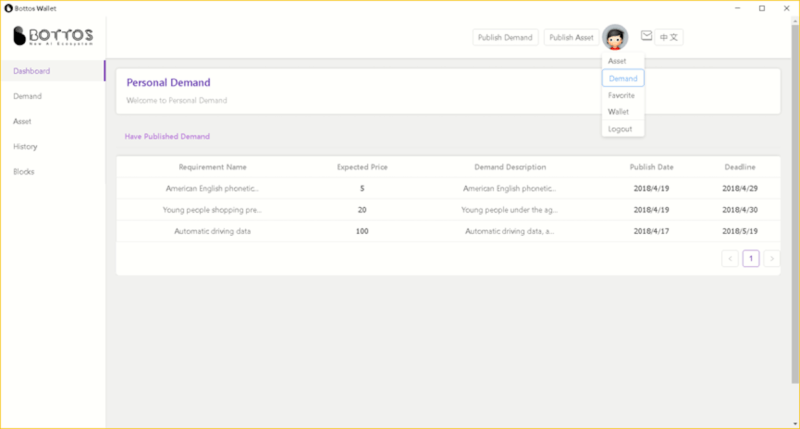Bottos launches a marketplace for data to train AI models
The blockchain-based ecosystem will also support other AI-oriented applications.

Countless marketing platforms are utilizing artificial intelligence, such as predictive modeling that recognizes patterns.
But, to recognize patterns and find insights, an AI engine needs to be trained with lots of examples.
A Singapore-based startup called Bottos says that the cost of data to train the model can take up half the budget for an AI or predictive modeling project. To reduce the cost and the hassle, the company this week launched a public beta of a blockchain-based Data Marketplace. A full release version is expected to launch late next month.
The marketplace is actually the first decentralized app, or DApp, on Bottos’s open-source public blockchain. Co-founder Xin Song told me that the custom-made blockchain is the backbone for an ecosystem based around various AI applications.
Other AI-oriented projects in progress with outside developers include model marketplaces, data storage-sharing networks and computer power-sharing networks. Additionally, a data validation service will be offered, as well as a rating system for AI companies and data providers.
In a typical use case for the data marketplace, he said, a company with an AI model might post a request in the community section for, say, 100 sets of 15-second audio clips of a voice speaking a particular Chinese dialect in order to train a voice recognition model. Or the request might be for browsing data matched with purchase data to glean what kind of online behavior might lead to a sale, for an AI-powered content personalization model.
The posted request for data would include the specific number of Bottos tokens the model owner is prepared to pay. The value of the tokens will be determined by what they can fetch in, say, dollars on a public token exchange.

Alternatively, the model owner could pay in its own tokens generated on the Bottos blockchain. Those tokens’ value is essentially a stake in the future commercial viability of that AI model.
Song said the blockchain protocol developed by his company differs from a common protocol like Ethereum because it is specifically designed for AI, with faster transaction processing and a section intended for data requests. There are no data miners, as there are in Ethereum, since block verification and addition is performed by an automated system.
Blockchain was chosen as the basis for this particular data marketplace application, he said, because a user’s identity can be permanently recorded, its open source nature is built around the idea of a community and it has the ability to generate tokens. Data ownership can be transparently tracked and traced.
However, while the identity is permanently recorded, it is verified through an email address and a cell phone, both of which could be faked by, let’s say, Russian intelligence hackers seeking to further wreak havoc on non-Russian tech firms. (Not that long ago, that would have been a ridiculous sentence to write.)
Song demonstrated differences by comparing two competitors, Ocean Protocol and Open Mined. The former, he said, offers an application with a similar data marketplace to train AI, but it employs other blockchains, while Bottos is a blockchain-based ecosystem with other applications and services.
AI companies use Open Mined, he said, to send their model to the data holder, where it is trained and returned.
I asked him, “Does it matter if I use the same training data on my model as my competitor does?”
“If I am an AI company,” Song replied, “I only care about the [quality of the] data, not whether it is the same” as someone else’s.
Marketing Land – Internet Marketing News, Strategies & Tips
(53)



